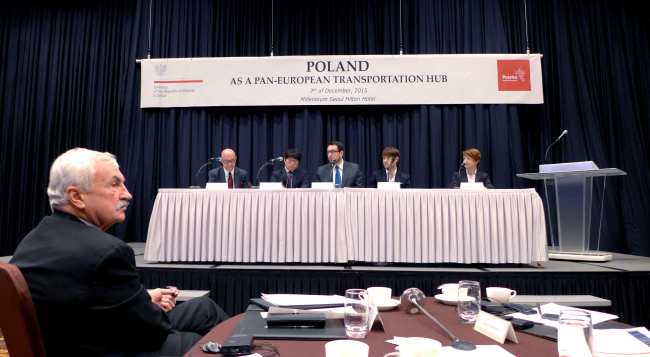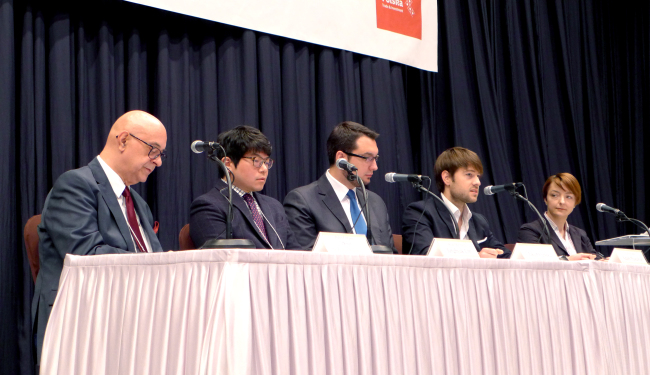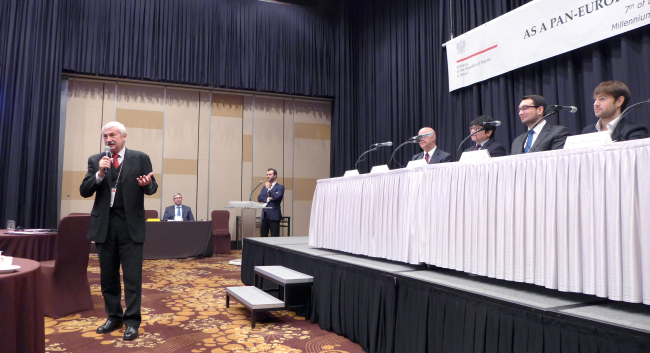Poland awaits investment as Europe’s transport hub
By Korea HeraldPublished : Dec. 14, 2015 - 03:00
Poland is modernizing its roads, railways, airports and seaports to be a “pan-European” transportation hub.
The Central European powerhouse is well positioned for the European Union’s infrastructure policy ― the Trans-European Transport Network ― unveiled by the European Commission in January last year, aimed at boosting East-West and North-South linkages across the continent.
Covering both passengers and freight, the ambitious initiative will close transport capacities between 28 member states, remove bottlenecks and standardize railway regulations. Incorporating the latest technologies, it is expected to facilitate economic recovery and growth by using its fund of 24 billion euros ($26.3 billion) set to last to 2020.
The Central European powerhouse is well positioned for the European Union’s infrastructure policy ― the Trans-European Transport Network ― unveiled by the European Commission in January last year, aimed at boosting East-West and North-South linkages across the continent.
Covering both passengers and freight, the ambitious initiative will close transport capacities between 28 member states, remove bottlenecks and standardize railway regulations. Incorporating the latest technologies, it is expected to facilitate economic recovery and growth by using its fund of 24 billion euros ($26.3 billion) set to last to 2020.

“Poland is a gateway to Europe thanks to its strategic location and developed infrastructure,” Polish Ambassador Krzysztof Ignacy Majka said at an investment seminar titled “Poland as a Pan-European Transportation Hub” in Seoul on Dec. 7.
“We offer optimal conditions for transport to all corners of Europe, being at the crossroads of the East-West corridor connecting the Baltic Sea and the North Sea and the North-South corridor linking the Baltic Sea and the Adriatic Sea.”
As part of the EU project, Poland is harnessing its intermodal transport capacities by developing logistics centers, he said, adding that a transcontinental rail connects China’s Chengdu and Poland’s Lodz and access to the deep-water container terminal at Gdansk Seaport improved.
Furthermore, Poland’s decision to join the Asian Infrastructure Investment Bank spearheaded by China would aid connectivity between Europe and Asia, Majka stressed.

Joanna Wasiewska, the head of political-economic section at the Polish Embassy, said her government supported the Eurasian partnership by improving transport intermodality, terminal infrastructures and knowledge-sharing among stakeholders.
“Poland also supports China’s ‘One Belt, One Road’ and Korea’s ‘Eurasia Initiative’” she noted.
Poland is connected by an intricate web of railways that link the country’s major cities and towns, particularly in western and southwestern areas. The state-owned Polish State Railways run domestic and international services across Europe.
According to Wasiewska, priorities in railway development include upgrading rolling stock, stations, passenger services, traffic safety and urban rails.
As part of the TETN scheme, Poland has also initiated numerous projects that would enhance connections between Warsaw and main cities through roads and expressways.

The country is building a network of sea and inland waterways, making use of the Vistula River, which runs across the country from the Baltic Sea, connecting major cities. Seaports, including the Port of Szczecin and the Port of Gdansk, are being upgraded for multimodal transports.
The largest airport in Poland is the Warsaw Frederic Chopin International Airport ― the hub of LOT Polish Airlines ― while Wroclaw, Gdansk, Katowice, Krakow and Poznan also have international airports.
Poland is Korea’s largest economic partner in central Europe and the fifth-largest investment destination for Korean companies in Europe. Some 150 Korean companies are operating in Poland, with total investments over $1.4 billion.
During President Park Geun-hye’s visit to the Visegrad Group of central European countries ― Poland, Hungary, Slovakia and the Czech Republic ― in early December, Seoul has vowed to step up cooperation in infrastructure and energy.
The EU is running a $385 billion European Fund for Strategic Investment until 2020 to mitigate economic imbalances between member states, 40 percent of which is allocated to the Visegrad Group countries. The V4 governments plan to inject over $50 billion of the fund into infrastructure development, covering highways, railways and intelligent transport system.
By Joel Lee (joel@heraldcorp.com)
-
Articles by Korea Herald




![[KH Explains] No more 'Michael' at Kakao Games](http://res.heraldm.com/phpwas/restmb_idxmake.php?idx=644&simg=/content/image/2024/04/28/20240428050183_0.jpg&u=20240428180321)














